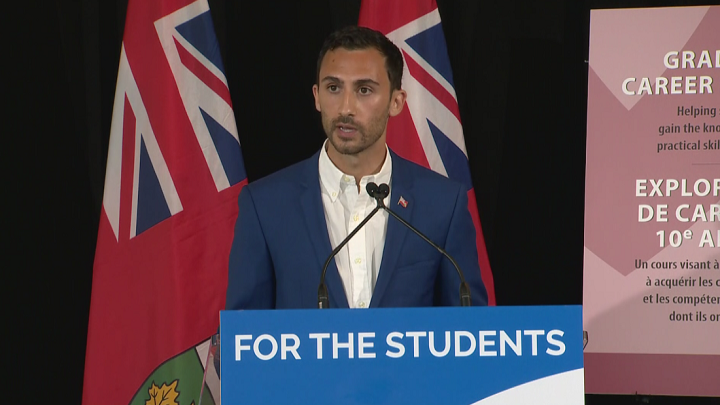TORONTO – Ontario’s new career studies curriculum for Grade 10 will include learning about financial literacy, including having students make a plan to fund their first year after high school.

The province’s new education minister, Stephen Lecce, unveiled the updated curriculum Tuesday at Toronto’s York University.
Lecce says the mandatory course will focus on “monetizable skills” and the jobs of the future, such as those in science, technology, engineering and math.
He says it will also teach students about the workplace implications of social media and how to protect their privacy online.
The new curriculum, which is slated to take effect in September, will also take a deeper look at financial management.
A document laying out the curriculum expectations says students will be asked to develop a budget for their first year after graduation and compare different forms of borrowing to pay for any post-secondary education they plan to seek, such as provincial student loans.

Get breaking National news
“Our mission is to ensure that our young people are better prepared to transition from the journey of learning seamlessly into the workforce,” Lecce said in a statement.
“With an emphasis on STEM, financial literacy, and transferable skills, we are better aligning our curriculum with the labour market, to ensure our young people can optimize their skills and get access to good-paying jobs.”
- Trump threatens to block opening of Gordie Howe International Bridge
- Liberal MP requests change to return-to-office policy for public servants
- Transport Canada job cuts could lead to public safety risks, union warns
- Starmer’s chief of staff resigns over Mandelson ambassador appointment despite Epstein ties
The Progressive Conservative government scrapped free tuition for low-income students in January and made several student fees that were previously mandatory, such as those that fund campus organizations and clubs, optional.
The move prompted backlash from student groups, including several protests.
The Tory government also announced a series of education reforms in March, which included increased class sizes for Grades 4 to 12 in an effort to cut costs.
The changes announced at that time also introduced a sexual education curriculum that returns to teaching gender identity and consent after a modernized lesson plan brought in by the previous Liberal government was revoked.
A new math curriculum was also unveiled, to be phased in over four years beginning this fall. The government is also making online courses a larger part of learning starting in 2020-2021, with students required to take a minimum of four credits out of 30 through e-learning courses to receive their diploma.
The union representing Ontario’s public high school teachers has said the change in class sizes means about 3,600 secondary school teachers will lose their jobs over four years.







Comments
Want to discuss? Please read our Commenting Policy first.